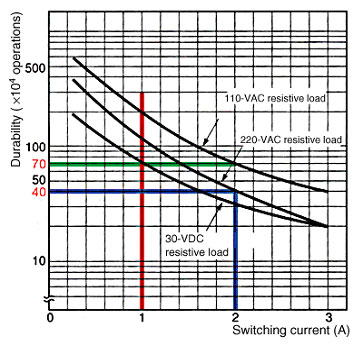Question
How do you use the durability curve?
Answer
The durability curve is used to check the maximum switching capacity (expected service life).
The following example will be used to describe how to find the maximum switching capacity of a contact at a particular contact current.
Look at the graph to determine what is the expected service life of Relays with 1-A contact current and 20-VDC resistive load.
MY4 General-purpose Relays

1.Draw a vertical line where the switching current is 1 A (red line).
2.Draw a horizontal line from the point of intersection with the 30-VDC resistive load curve (green line).
3.Where the green line intersects with the durability axis is the expected service life. In this case, the expected number of operations is 700,000 operations.
Example:
What is the expected service life for a 220-VAC 2-A resistive load?
Answer:
Approximately 400,000 operations (blue line).
Recommended Products
 MY
MY
Best-selling, general-purpose relays that can be selected based on operating environment and application
 LY
LY
Power-switching Compact General-purpose Relays
 G3PE (Three-phase)
G3PE (Three-phase)
Compact, Slim-profile SSRs with Heat Sinks. Solid State Contactors for Three-phase Heaters Reduced Installation Work with DIN Track Mounting.
Other General Purpose Relays FAQ
-
 The Relay does not operate even when voltage is applied. Why is this?
The Relay does not operate even when voltage is applied. Why is this?
-
 We were using G2R General Purpose Relay to turn a solenoid valve ON and OFF, and sparks at the contact damaged the relay after only about 3 months of use. What caused this, and what kind of countermeasure is there for it?
We were using G2R General Purpose Relay to turn a solenoid valve ON and OFF, and sparks at the contact damaged the relay after only about 3 months of use. What caused this, and what kind of countermeasure is there for it?
-
 A Relay burned out. Why is this?
A Relay burned out. Why is this?